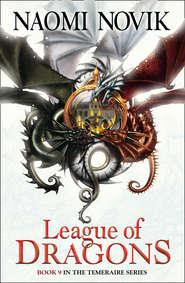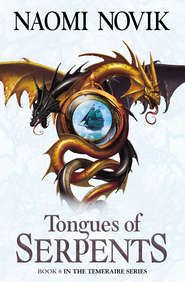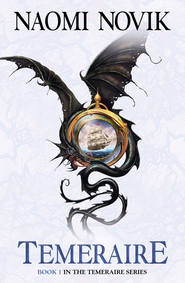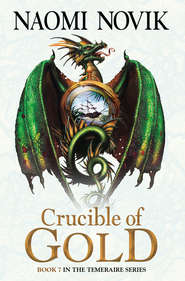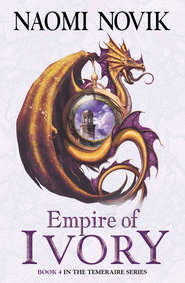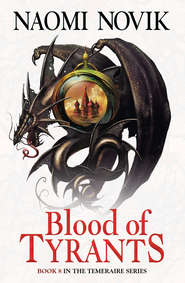По всем вопросам обращайтесь на: info@litportal.ru
(©) 2003-2024.
✖
Black Powder War
Автор
Год написания книги
2019
Настройки чтения
Размер шрифта
Высота строк
Поля
‘Or which spread the tyranny over more hands, piecemeal,’ Tharkay said. ‘I do not know that the Chinese system is any worse; there is a limit to the evil one despot alone can do, and if he is truly vicious he can be overthrown; a hundred corrupt members of Parliament may together do as much injustice or more, and be the less easy to uproot.’
‘And where on the scale would you rank Bonaparte?’ Laurence demanded, growing too indignant to be polite: it was one thing to complain of corruption, or propose judicious reforms; quite another to lump the British system in with absolute despotism.
‘As a man, a monarch, or a system of government?’ Tharkay asked. ‘If there is more injustice in France than elsewhere, on the whole, I have not heard of it. It is quixotic of them to have chosen to be unjust to the noble and the rich, in favour of the common; but it does not seem to me naturally worse; or, for that matter, likely to last long. As for the rest, I will defer to your judgement, sir; who would you take on the battlefield: good King George or the second lieutenant of artillery from Corsica?’
‘I would take Lord Nelson,’ Laurence said. ‘I do not believe anyone has ever suggested he likes glory less than Bonaparte, but he has put his genius in service to his country and his King, and graciously accepted what rewards they chose to give him, instead of setting himself up as a tyrant.’
‘So shining an example must vanquish any argument, and indeed I should be ashamed to be the cause of any disillusionment.’ Tharkay’s faint half-smile was visible now: it was growing lighter outside. ‘We have a little break in the storm, I think; I will go and look in on the camels.’ He wrapped a veil of cotton several times around his face, pulling his hat firmly down over all, and drew on his gloves and cloak before ducking out through the flaps.
‘Laurence, but the government must listen in our case, because there are so many dragons,’ Temeraire said, interrogatively, when Tharkay had gone out, returning to the point of real concern to him.
‘They shall listen,’ Laurence said, still smouldering and indignant, without thinking; and regretted it the next instant: Temeraire, only too willing to be relieved of doubt, brightened at once and said, ‘I was sure it must be so,’ and whatever good the conversation might have done, in lowering his expectations, was lost.
The storm lingered another day, fierce enough to wear holes, after a while, in the leather of their pavilion; they patched it as best they could from inside, but dust crept in through all the cracks, into their garments and their food, gritty and unpleasant when they chewed the cold dried meat. Temeraire sighed and shivered his hide now and again, little cascades of sand running off his shoulders and wings onto the floor: they had already a layer of desert inside the tent with them.
Laurence did not know just when the storm ended: as the blessed silence began to fall, they all drifted into their first real sleep in days, and he woke to the sound of the eagle outside giving a red cry of satisfaction. Stumbling out of the tent, he found it tearing raw flesh from the corpse of a camel lying across the remains of the campfire pit, neck broken and white ribcage already half stripped clean by the sands.
‘One of the tents did not hold,’ Tharkay said, behind him. Laurence did not at once take his meaning: he turned and saw eight of the camels, tethered loosely near a heap of piled forage, swaying a little on legs grown stiff from their long confinement; the tent which had sheltered them was still up, leaning somewhat askew with a sand-drift piled up against one side. Of the second tent there was no sign except two of the iron stakes still planted deeply in the ground, and a few scraps of brown leather pinned down, fluttering with the breeze.
‘Where are the rest of the camels?’ Laurence said, in growing horror. He took Temeraire aloft at once, while the men spread out, calling, in every direction, in vain: the scouring wind had left no tracks, no signs, not so much as a scrap of bloody hide.
By midday they had given it up, and began in desolate spirits to pack up the camp; seven camels lost, and their water-casks with them, which they had left on to keep them weighted down and quiet. ‘Will we be able to buy more in Cherchen?’ Laurence asked Tharkay, wearily, wiping a hand across his brow; he did not recall seeing many animals in the streets of the town, which they had left nearly three days before.
‘Only with difficulty,’ Tharkay said. ‘Camels are very dear here, and men prize them highly; some may object to selling healthy beasts to be eaten. We ought not turn back, in my opinion.’ At Laurence’s doubtful look, he added, ‘I set the number at thirty deliberately high, in case of accidents: this is worse than I had planned for, but we can yet manage until we reach the Keriya River. We will have to ration the camels, and refill Temeraire’s water casks as best we can at the oases, forgoing as much as we can ourselves; it will not be pleasant, but I promise you it can be done.’
The temptation was very great: Laurence bitterly grudged the loss of more time. Three days back to Cherchen, and likely a long delay there acquiring new pack animals, all the while having to manage food and water for Temeraire in a town unaccustomed to supporting any dragons at all, much less one of his size; a clear loss of more than a week, certainly. Tharkay seemed confident, and yet— and yet—
Laurence drew Granby behind the tents, to consult in privacy: considering it best to keep their mission secret, so far as possible, and not to spread any useless anxiety over the state of affairs in Europe, Laurence had not yet shared their purpose with the rest of the crew, and left them to believe they were returning overland only to avoid the long delay in port.
‘A week is enough time to get the eggs to a covert somewhere,’ Granby said, urgently. ‘Gibraltar— the outpost on Malta— it might be the difference between success and failure. I swear to you there is not a man among us who would not go hungry and thirsty twice as long for the chance, and Tharkay is not saying there is a real risk we shall run dry.’
Abruptly Laurence said, ‘And you are easy in your mind, trusting his judgement on the matter?’
‘More than any of ours, surely,’ Granby said. ‘What do you mean?’
Laurence did not know quite how to put his unease into words; indeed he hardly knew what he feared. ‘I suppose I only do not like putting our lives so completely into his hands,’ he said. ‘Another few days of travel will put us out of reach of Cherchen, with our present supplies, and if he is mistaken—’
‘Well, his advice has been good so far,’ Granby said, a little more doubtfully, ‘though I won’t deny he has a damned queer way of going on, sometimes.’
‘He left the tent once, during the storm, for a long while,’ Laurence said quietly. ‘That was after the first day, halfway through— he said he went to look in on the camels.’
They stood silently together. ‘I don’t suppose we could tell by looking how long that camel has been dead?’ Granby suggested. They went to try an inspection, but too late: Gong Su already had what was left of the dead beast jointed and spitted over a fire, browning to a turn, and offering no answers whatsoever.
When consulted, Temeraire said, ‘It seems a very great pity to turn around to me also. I do not mind eating every other day,’ and added under his breath, ‘especially if it must be camel.’
‘Very well; we continue on,’ Laurence said, despite his misgivings, and when Temeraire had eaten, they trudged onward through a landscape rendered even more drear by the storm, scrub and vegetation torn away, even the scattering of colourful pebbles blown away, leaving no relief to the eye. They would have gladly welcomed even one of the grisly trail-markers, but there was nothing to guide their steps but the compass and Tharkay’s instincts.
The rest of the long dry day passed by, as terrible and monotonous in its turn as the storm, miles of desert grinding slowly away under their feet; there was no sign of life, nor even one of the old crumbling wells. Most of the crew were riding on Temeraire now, trailing the sad little string of camels remaining; as the day wore on, even Temeraire’s head drooped: he too had only had half his usual ration of water.
‘Sir,’ Digby said through cracked lips, pointing, ‘I see something dark over there, though it’s not very big.’
Laurence saw nothing; it was late in the day, with the sun beginning to make queer long shadows out of the small twisted rocks and stumps of the desert landscape, but Digby had the sharp eyes of youth and was the most reliable of his lookouts, not given to exaggeration. So they went on towards it: soon they could all see the round dark patch, but it was too small to be the mouth of a well. Tharkay stopped the camels beside it, looking down, and Laurence slid down from Temeraire’s neck to walk over: it was the lid of one of the lost water-casks, lying incongruously all alone atop the sand, thirty miles of empty desert away from the morning’s camp.
* * *
‘Eat your ration,’ Laurence said sternly, when he saw Roland and Dyer putting down their strips of meat half-eaten: they were all hungry, but the long chewing was painful in a dry mouth, and every sip of water now had to be stolen from Temeraire’s casks; another long day had gone, and still they had found no well. Temeraire had eaten his camel raw, so as not to lose any of the moisture in cooking: only seven left, now.
Two days later they stumbled across a dry, cracked irrigation channel, and on Tharkay’s advice turned northwards to follow its path, hoping to find some water still at its source. The wizened and twisted remains of dead fruit trees still overhung the sides, their small gnarled branches dry as paper to the touch, and as light, reaching for the vanished water. The city took shape out of the desert haze as they rode onwards: shattered timbers jutting out of the sand, sharpened by years of wind into pointed stakes; broken pieces of mud-and-wattle bricks; the last remnants of buildings swallowed by the desert. The bed of the river that had once given life to the city was filled with fine dust; there was nothing living in sight but some brown desert grass clinging to the tops of dunes, which the camels hungrily devoured.
Another day’s journey would put them beyond the hope of turning back. ‘I am afraid this is a bad part of the desert, but we will find water soon,’ Tharkay said, bringing an armful of old broken timbers to the campfire. ‘It is just as well we have found the city; we must be on an old caravan route now.’
Their fire leapt and crackled brightly, the dry seasoned wood going up hot and quick; the warmth and light was comforting in the midst of the ashes and broken relics of the city, but Laurence walked away brooding. His maps were useless, there were no marked roads, nothing to be seen in any direction for miles; and his patience was badly frayed at seeing Temeraire go hungry and thirsty: ‘Pray do not worry, Laurence, I am very well,’ Temeraire had assured him; but he had not been able to keep his eyes from lingering on the remaining camels, and it hurt Laurence to see how quickly he tired, each day, with his tail now often dragging upon the sand: he did not wish to fly, but plodded along in the wake of the camels, and lay down often to rest.
If they turned back in the morning, Temeraire could eat and drink his fill; they might even load two of the water-casks upon him, slaughter an additional camel for him to carry, and try to make Cherchen by air. Laurence thought two days’ flight would see them there, if Temeraire went lightly burdened and had food and water enough. He would take the youngest of the crew: Roland and Dyer and the ensigns, who would slow the others down on the ground and need less water and food for Temeraire to carry; though he would not like leaving the rest of the men, by his calculation the water carried by the last four camels would be just sufficient to see them back to Cherchen by land, if they could manage twenty miles in a day.
Money would then present difficulties: he did not have so much silver he could afford to purchase another great string of camels even if the beasts could be found, but perhaps someone might be found who would take the risk of accepting a note on the strength of his word, offered at an exorbitant rate; or they might exchange some labour: there did not seem to be dragons living in the desert towns, and Temeraire’s strength could accomplish many tasks quickly. In the worst case, he might pry the gold and gems off the hilt of his sword, to be later replaced, and sell the porcelain vase if he could find a taker. God only knew how much delay it would all mean: weeks if not a month, and many fresh risks taken; Laurence took his turn at watch and went to sleep still undecided, unhappy, and woke with Granby shaking him in the early morning, before dawn: ‘Temeraire hears something: horses, he thinks.’
The light crept along the crests of the low dunes just outside the town: a knot of men on shaggy, short-legged ponies, keeping a good distance; even as Laurence and Granby watched, another five or six rode up onto the top of the dune to join them: carrying short curved sabres, and some others with bows. ‘Strike the tents, and get the camels hobbled,’ Laurence said grimly. ‘Digby, take Roland and Dyer and the other ensigns and stay by them: you must not let them run off. Have the men form up around the supplies; backs to that wall, over there, the broken one,’ he added to Granby.
Temeraire was sitting up on his haunches. ‘Are we going to have a battle?’ he asked, with less alarm than eager anticipation. ‘Those horses look tasty.’
‘I mean to be ready, and let them see it, but we are not going to strike first,’ Laurence said. ‘They have not threatened us yet; and in any case, we had much better buy their help than fight them. We will send to them under a flag of truce. Where is Tharkay?’
Tharkay was gone: the eagle also, and one of the camels, and no one remembered seeing him go. Laurence was conscious at first of only shock, more profound than he ought to have felt, having been suspicious. The sensation yielded to a cold savage anger, and dread: they had been drawn just far enough that the camel stolen meant they could not turn back to Cherchen; and the bright beacon of the fire, last night, perhaps had drawn down this hostile attention.
With an effort he said, ‘Very well; Mr. Granby, if any of the men know a little Chinese, let them come with me under the flag; we will see if we can manage to make ourselves understood.’
‘You cannot go yourself,’ Granby said, instantly protective; but events obviated any need for debate on the matter: abruptly the horsemen wheeled around as one and rode away, vanishing into the dunes, the ponies whinnying with relief.
‘Oh,’ Temeraire said, disappointed, and drooped back down onto all fours; the rest of them stood uncertainly a while, still alert, but the horsemen did not reappear. ‘Laurence,’ Granby said quietly, ‘they know this ground, I expect, and we do not; if they mean to have at us and they have any sense, they will go away and wait for tonight. Once we have encamped, they can be on us before we know they are there, and maybe even do Temeraire some mischief. We oughtn’t let them just slip away.’
‘And more to the point,’ Laurence said, ‘those horses were not carrying any great deal of water.’
The soft dented hoofprints led them a wary trail west and southwards, climbing over a series of hills; a little hot wind came into their faces as they walked, and the camels made low eager moaning noises and quickened their pace unasked: over the next rise the narrow green tops of poplar trees came unexpectedly into view, waving, beckoning them on over the rise.
The oasis, hidden in a sheltered cleft, looked only another small brackish pool, mostly mud, but desperately welcome for all that. The horsemen were there gathering on the far edge, their ponies milling around nervously and rolling their eyes as Temeraire approached, and among them was Tharkay, with the missing camel. He rode up to them as if unconscious of any wrong, and said to Laurence, ‘They told me of having seen you; I am glad you thought to follow.’
‘Are you?’ Laurence said.
That stopped him a moment; he looked at Laurence, and the corner of his mouth twisted upwards a little; then he said, ‘Follow me,’ and led them, their hands still full of pistols and swords, around the edges of the meandering pond: clinging to the side of one grassy dune was a great domed structure built of long narrow mud bricks, the same pale straw colour as the yellowed grass, with a single arched opening looking in, and a small window in the opposite wall which presently let in a shaft of sunlight to play upon the dark and shining pool of water that filled the interior. ‘You can widen the sardoba opening for him to drink, only be careful you do not bring down the roof,’ Tharkay said.
Laurence kept a guard facing the horsemen across the oasis, with Temeraire at their backs, and set the armourer Pratt to work with a couple of the taller midwingmen to help. With his heavy mallet and some pry-bars they shortly had tapped away more bricks from the sides of the ragged opening: it was only just large enough before Temeraire had gratefully plunged in his snout to drink, great swallows going down his throat; he lifted his muzzle out dripping wet and licked even the drops away with his long narrow forking tongue. ‘Oh, how very nice and cool it is,’ he said, with much relief.
‘They are packed with snow during the winter,’ Tharkay said. ‘Most have fallen into disuse and are now left empty, but I hoped we might find one here. These men are from Yutien: we are on the Khotan road, and in four more days we will reach the city: Temeraire can eat as he likes, there is no more need to ration.’
‘Thank you; I prefer to yet exercise a little caution,’ Laurence said. ‘Pray ask those men if they will sell us some of their animals: I am sure Temeraire would enjoy a change from camel.’
One of the ponies had gone lame, and the owner professed himself willing to accept in exchange five Chinese taels of silver. ‘It is an absurd amount,’ Tharkay commented, ‘when he cannot easily get the animal home again,’ but Laurence counted the money well-spent as Temeraire tore into the meal with a savage delight. The seller looked equally pleased with his end of the bargain, if less violently demonstrative, and climbed up behind one of the other riders; they and some four or five others at once left the oasis, riding away southwards in a cloud of rising dust. The rest of the horsemen stayed on, boiling water for tea over small grass fires and sending sideways, covert looks across the pond at Temeraire, who now lay drowsy and limp in the shade of the poplars, snorting occasionally in his sleep and otherwise inert. They might only have been nervous for the sake of their mounts, but Laurence began to fear he had by his free-spending given the horsemen cause to think them rich and tempting prey, and he kept the men on close watch, letting them go to the sardoba only by twos.






